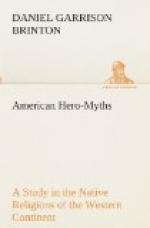For many years, some said for two thousand years, did he rule the people with equity, and then he departed, going back to the East whence he came, said some authorities, but others averred that he rose up to heaven. At any rate, before he left, he appointed a successor in the sovereignty, and recommended him to pursue the paths of justice.[1]
[Footnote 1: “Afirman que fue trasladado al cielo, y que al tiempo de su partida dexo al Cacique de aquella Provincia por heredero de su santidad i poderio.” Lucas Fernaudez Piedrahita, Historia General de las Conquistas del Nueoo Reyno de Granada, Lib. i, cap. iii (Amberes, 1688).]
What led the Spanish missionaries to suspect that this was one of the twelve apostles, was not only these doctrines, but the undoubted fact that they found the symbol of the cross already a religious emblem among this people. It appeared in their sacred paintings, and especially, they erected one over the grave of a person who had died from the bite of a serpent.
A little careful investigation will permit us to accept these statements as quite true, and yet give them a very different interpretation.
That this culture-hero arrives from the East and returns to the East are points that at once excite the suspicion that he was the personification of the Light. But when we come to his names, no doubt can remain. These were various, but one of the most usual was Chimizapagua, which, we are told, means “a messenger from Chiminigagua.” In the cosmogonical myths of the Muyscas this was the home or source of Light, and was a name applied to the demiurgic force. In that mysterious dwelling, so their account ran, light was shut up, and the world lay in primeval gloom. At a certain time the light manifested itself, and the dawn of the first morning appeared, the light being carried to the four quarters of the earth by great black birds, who blew the air and winds from their beaks. Modern grammarians profess themselves unable to explain the exact meaning of the name Chiminigagua, but it is a compound, in which, evidently, appear the words chie, light, and gagua, Sun.[1]
[Footnote 1: Uricoechea says, “al principio del mundo la luz estaba encerrada en una cosa que no podian describir i que llamaban Chiminigague, o El Criador.” Gramatica de la Lengua Chibcha, Introd., p. xix. Chie in this tongue means light, moon, month, honor, and is also the first person plural of the personal pronoun. Ibid., p. 94. Father Simon says gagua is “el nombre del mismo sol,” though ordinarily Sun is Sua.]
Other names applied to this hero-god were Nemterequeteba, Bochica, and Zuhe, or Sua, the last mentioned being also the ordinary word for the Sun. He was reported to have been of light complexion, and when the Spaniards first arrived they were supposed to be his envoys, and were called sua or gagua, just as from the memory of a similar myth in Peru they were addressed as Viracochas.




